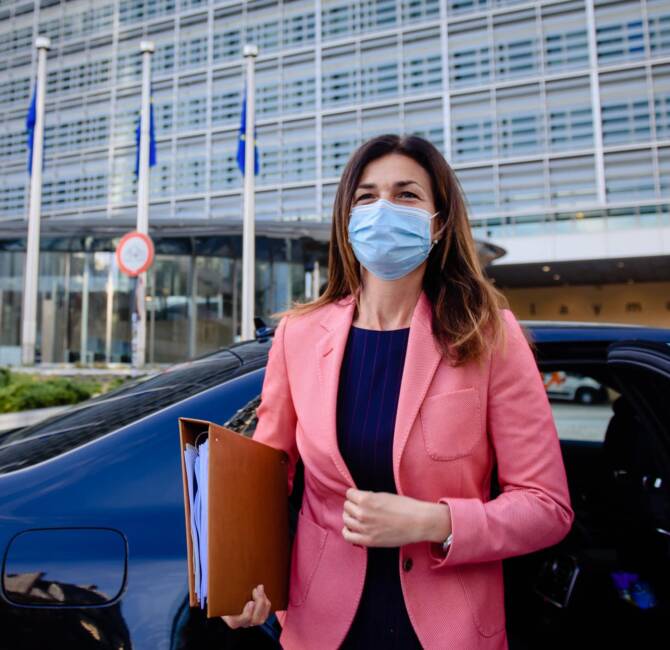This article was published online by the Magyar Nemzet on 12 February 2022.
In Hungary, NGOs (non-governmental organisations) have nothing to be afraid of, there is no intention to foil their operations, and foreign investors, too, can feel safe, reveals the next instalment of our newspaper’s series of articles in which we quote again from the Skype interviews sent to Magyar Nemzet from an unkown e-mail address. The parties to the interviews are without exception civil society actors who, together with their organisations, attacked and continue to attack almost every measure adopted by the Hungarian government. However, in conversations among themselves – as our writings published in recent weeks reveal – they openly admit that by manipulating uninformed foreign journalists, they depict a false, distorted image of Hungary.
A project leader of the Hungarian Civil Liberties Union (TASZ) sponsored by George Soros stated that the various NGOs can maintain their operations in Hungary in perfect safety. According to Márton Asbóth, TASZ therefore never devised a detailed plan B for the event that the government should want to close down such organisations.
He reassured his unknown interviewer that NGOs need not be concerned about harassment by the state. “And so, in terms of what we should maybe prepare ourselves for, what we should take into consideration, is there anything they can actually do to, for instance, stop funding, or to stop the day-to-day operations, is there at all something that they could legally do?” Asbóth was asked. He said:
“No, I don’t think so. Actually, there were no scenes, you know, like police officers coming to you in NGO offices or freezing bank accounts. So, the very Russian situation has never happened before in Hungary, and I trust it wouldn’t.”
Yesterday, we cited a part of the Skype interview in which he said the international press misrepresents the situation in Hungary, and in this context Mr Asbóth pointed out that while according to foreign media reports there are authoritarian regimes in power in Hungary and Poland, in his view both countries are great places to live in.
Kristóf Zoltán Varga, who previously worked as the Budapest director of the Open Society Foundations, also confirmed that NGOs can operate safely in Hungary, and reassured his interviewer that funds coming from abroad, too, safely reach these organisations.
“We are members of the EU, and so it would be difficult for the government to stop funding [coming from abroad]. As the funding comes from abroad, they can’t stop the money from arriving via certain channels; at most, they might be able to obstruct the functioning of the channels themselves,”
he stated.
A civilised place
Dalibor Rohac, a senior researcher of the American Enterprise Institute (AEI) said Hungary is a perfectly safe place for foreign investors as well. In his view, the media attention focused on Hungary in the international press does not mean that business actors should have anything to worry about as regards the safety of private property, corruption or the legal environment.
“Hungary is a member of both the EU and NATO, and greatly depends on foreign investments. If we take a look at the influx of large corporations, we will see that the largest companies such as Audi, Mercedes and the others provide jobs for tens of thousands of people. So, the situation is not like in Russia. Over here, people are not locked up in prison, the government doesn’t nationalise big companies. I believe that foreign investors don’t have much to worry about,” the AEI’s senior associate said. According to Mr Rohac, Hungary started from a much better situation than Bulgaria or Romania, and by Central-Eastern-European standards Hungary is a civilised place where you can rely on the courts to enforce contracts.
Blind hatred
In an interview which was probably made during the first or second wave of the coronavirus pandemic, Anderj Nosko mentioned the perception of the management of the coronavirus pandemic as an example of the fact that the government was even criticised for guaranteeing society’s safety with the restrictive measures introduced due to the pandemic.
“Let’s take a look at the pandemic crisis from the very beginning. […] Now, the big question is the closure of borders. Entry for non-nationals and those without a registered address in Hungary was restricted. This measure is largely viewed based on whether you are on the government’s side or not. I’ve seen or read very few evaluations which assess these measures on their actual merits. Whether this rule helps the fight against the pandemic, and what its implications are for health care and the economy. The whole thing is mainly about the fact that ‘we hate Orbán, and so this is a bad measure,”
Mr Nosko said.
Biased campaign
Readers may remember that in a Skype interview quoted by Magyar Nemzet earlier, Mr Nosko stated in black and white that there is an unfounded, biased campaign against Hungary and Poland, and that uninformed foreign journalists manipulated by NGOs depict a distorted image of Hungary. In his view, the circumstance that mainstream media now work with far fewer foreign correspondents than before, and that they are additionally required to report on the affairs of multiple countries leads to intellectual laziness.
“As a result, Poland and Hungary can be criticised very easily, without actual arguments,” the former director of the Soros Foundations stated. He said a further problem is that many foreign journalists do not speak Hungarian, and so they are unable to talk to ordinary people in the street and are likewise unable to read the local news. They therefore rely on secondary sources – mostly, on persons sharing the same political views as themselves – and this leads to distorted reports on the Hungarian government.
Freedom House and agitprop
“These secondary sources are rather distorted, including as regards the legitimacy of the Hungarian government,” the former director of OSF said. According to Mr Nosko, they typically fail to mention that the Hungarian cabinet is, in actual fact, highly popular in large segments of society.
Mr Nosko also spoke about the NGO Freedom House whose activities are well-documented in Hungary.
“When reading like ‘nations in transit’ of Freedom House – I’m their reviewer for the Slovak chapter – and sometimes it’s so irritating to see that instead of the analysis you have essentially agitprop, you know. Essentially, whenever it’s your friends who are in the government, then the country is doing well. If it’s not your friends in the government, then whatever they do is just not good enough,” he said.
Fico was not attacked
“It’s a simple reality: people working in the media are in the vast majority left-liberal. This is due to what we could call ‘selection bias,’” said Andrej Nosko, describing the present situation in the international media. He took the view that if the Hungarian prime minister were a socialist, both the media and the European Union would treat him differently. He mentioned Robert Fico’s premiership in Slovakia and his level of acceptance as an example.
In another Skype interview, Dalibor Rohac, a Slovak researcher who studied the processes of Eastern and Central Europe and the EU as a research associate of the American Enterprise Institute, too, mentioned Robert Fico as an example. He said the government led by Fico which was nominally social democrat was rather corrupt, but Fico was regarded as one of their own given that he belonged to the group of European socialists. This is why Mr Fico never had to encounter the same degree of pushback from Brussels as Viktor Orbán.
In Mr Rohac’s opinion, if Orbán were voted out, and the Hungarian socialists came back, there would be a massive sigh of relief in Brussels.
Control
In yet another Skype interview, former contributor of the news portals 24.hu and Index Mátyás Kálmán, too, spoke about bias. He said various NGOs manipulate or even bribe journalists reporting about Hungary, and so they tend to misrepresent events taking place in the country.
“You don’t know whether a given journalist received an invitation to a fine hotel, and how much he or she was offered to write the story that they want to hear told in the media,” Mr Kálmán said describing an example of manipulative practices, specifically mentioning Amnesty International, an organisation financed by George Soros, as one of the NGOs that seek to control journalists.




